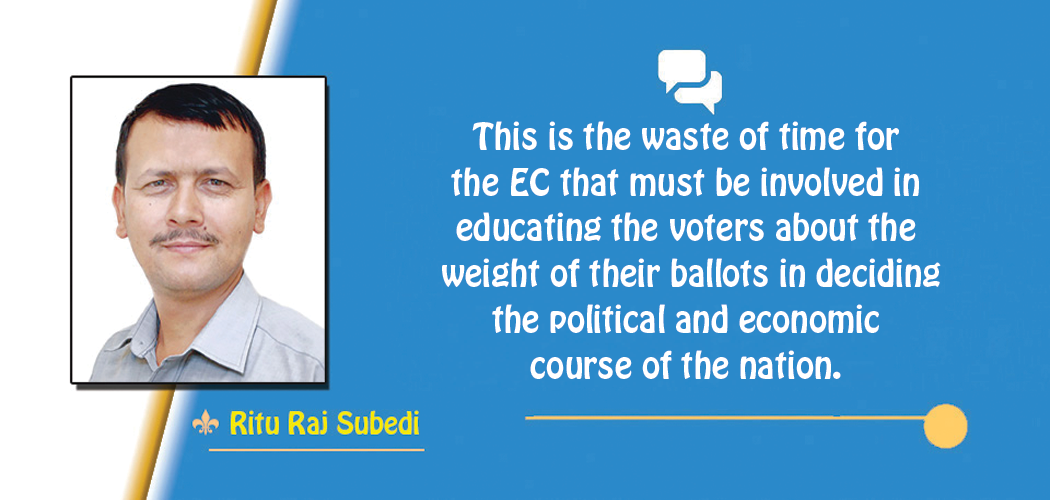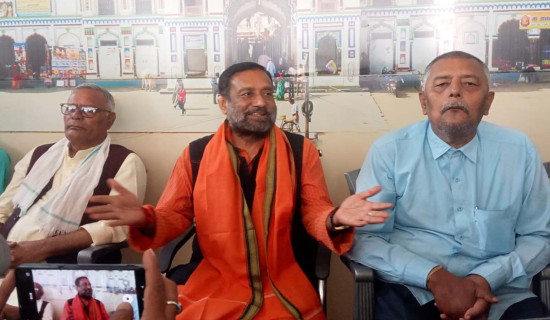- Friday, 27 February 2026
Local Polls: A Democratic Milestone
Nepal’s federal republican system is set to attain another milestone this week. The country goes for the local elections on May 13 for the second time after it became a federal democratic republic with the promulgation of new constitution in 2015. The local polls deepen the grassroots democracy and decentralised form of governance. Democracy is a bottom-up process and the local election gives momentum to this process by sending the fresh representatives to the public offices. It nourishes popular sovereignty essential for the legitimacy and functionality of the federal set-up.
Local bodies form an integral part of the three-tier political and administrative structures that replaced unitary monarchical dispensation through the new charter. The popular uprising that is also known as Janandolan-II paved the way for tectonic structural changes in the country. Nepal has experimented scores of political systems since it was unified in 1769 but its quest for a system that guarantees durable stability and inclusive prosperity continues to date. The present federal, secular and republican system, believed to be the most comprehensive and progressive one, is expected to realise those high aspirations for which countless Nepalis sacrificed their lives and spent their entire political career.
Constitutional priority
The constitution has attached top priority to the local bodies by conferring at least 22 exclusive rights on them in addition to a string of concurrent powers they share with the centre and provinces. Altogether 753 local units, which also act as executive, legislative and judicial entities, have been mandated to explore and mobilise the local resources to expedite local development. Thus, the local polls hold the key to providing democratic resilience to the nation that endured ruthless decade-long insurgency, devastating earthquake and deadly COVID-19 pandemic in recent times.
Because of power and resources, the local units have gained huge traction as seen in the formation of electoral alliances, campaigns and postures of the major political forces during the campaign. The first five-year tenure of the local bodies has mix bag of results. Some have really punched above their weight in terms of infrastructure development and service delivery but most of the elected officials have run the gauntlet for their inclination to amass money through dubious means or by exploiting the legal loopholes. In fact, our local units require able leadership, intellectual capacity, qualified human resources and vigilant citizenry to make them functional and capable to address the public concerns.
In absence of institutional capacity and visionary leadership, the local units failed to unlock their potentials. As stipulated by constitution, they have completed their five-year terms but the dissolution of House of Representatives (HoR) and ensuing House deadlock has left negative repercussions for the efficacy of local government hailed as the vehicle of direct democracy. The House could not formulate vital laws necessary to determine the judicious distribution of natural resources among the three-tier governments and remove the ambiguities and practical difficulties they are facing. Elections create decisive moments for both the political parties and the people. They offer the opportunities to correct, recycle and refine the system. To make election as a tool of democratic renewal, there must be a level playing field so that every candidate feels that polls are not unfair and that the system is not rigged in favour of those with economic muscle and nexus with power cliques. As the polls have become a costly affair, it has become an uphill task to maintain financial integrity of parties and their contesters. The Election Commission has the onus to track the sources of spending of candidates beyond the ceiling fixed by it.
During the poll campaign, the candidates should be engaged in healthy act of persuasion to woo the voters in their favour. They need to demonstrate democratic culture and constitutional behaviour. Recourse to the filthy cuss and mutual accusation gives rise to fundamentalism and culture of intolerance, distracting and depriving the voters of policy choices. The voters need to be imparted civic education to make them aware of rationale of voting. Democracy is also an art of compromise that demands the cognitive orientation to basic democratic values.
Democratic moment
Elections build a democratic moment – how the voting impacts the democratic process. Therefore, the EC, political parties, media and civil society should educate the voters about their rights and duties.
They must be acquainted with the functions of public institutions that should be autonomous and impersonal so that they can efficiently ensure public goods – health, education, security, information, environment and culture – for the people. The culture of hurling curse against each other exposes the egoistic nature and parochial mindset of candidates and their mentors. This also violates the election code of conduct, forcing the EC to seek clarification from the erring candidates time and again. This is the waste of time for the EC that must be involved in educating the voters about the weight of their ballots in deciding the political and economic course of the nation.
(The author is Deputy Executive Editor of this daily.)

















